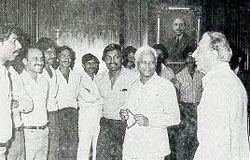The Golden Boot
Triumph and Trauma of a Coach
M. K. Kaushik with K. Arumugam
 n November
29, 1998, at about 2:30 pm, our team left the SAI campus for Bangalore
station. SAI coaches and many officials came to the station to see us off. They
flooded us with flowers and bouquets. The journey by Shatabdi Express was
pleasant, and we reached Chennai Central by 9:30 pm.
n November
29, 1998, at about 2:30 pm, our team left the SAI campus for Bangalore
station. SAI coaches and many officials came to the station to see us off. They
flooded us with flowers and bouquets. The journey by Shatabdi Express was
pleasant, and we reached Chennai Central by 9:30 pm.
After about a 30-minute ride, we were pleasantly surprised to come to the Connemara Hotel of the Taj Group.
In Bangalore, we had been told that we would be lodged in the Nest International
hotel. The Taj was many notches better than Nest; in fact, the two hotels are
not at all comparable.
We found out that the Taj Group of the Tatas were sponsoring our stay. It was
a grand gesture from the corporate giant Tatas that they wanted to associate
themselves with hockey. I was all the more happy since I spent my playing career
with Tata Sports Club, leading the team in many domestic tournaments.
From Chennai, we flew to Bangkok, and reached Bangkok airport at 1600 hours
after a pleasant 4-hour flight. There was a 2-hour wait for us to get our
accreditations. Also, Baljeet Dhillon lost his passport during the bus journey
to the picturesque Games village. It was luckily traced soon. We reached the
village around 8 pm.
We are allotted the ground floor in a multi-storyed complex numbered B-12.
Nearly 20 to 22 double rooms were in that wing, far more than our requirement.
The organisers took into account accommodation for allied personnel like
physiotherapist, video recording persons, doctor, masseur, etc. We had none of
them! In fact, we had requested a doctor exclusively for our team, but that
request was turned down by the Indian Olympic Association (IOA).
Our team manager was Mr. Mohinder Singh Malik, Inspector General of Police,
Haryana. Malik was a Lord Krishna bhakt. He used to chant mantras
with the team on match days.
Malik was jovial and intelligent, but somewhere in a remote corner of him was
some ego. He did not like players asking him for petty tasks to be done. He might
have thought that those were below the dignity of a man of his stature - the police
chief of a state. He would also not accompany us for the morning session
practices. Seniors naturally resented this. I played the role of mediator
between the manager and the players to see that nothing untoward happened.
The hockey team was a popular one among the various Indian contingents.
Once, G. S. Mander, our chef-de-mission, told me that he would rate the hockey
gold on one side, and the rest of the golds on the other side. We were certainly
motivated by this remark.
We saw the South Koreans recording our practice sessions from a distance.
They had an exclusive team just for video recording. We were supposed to get one
recording person from the IOA, but we never got one. We had to rely on locals
for video recordings.
I remember I had tried hard to get the video of the India-Malaysia semi-final in
the Commonwealth Games. The cost of the video turned out to be prohibitive. The then
manager Balakrishnan thought that the IHF secretary Jyothi would arrange it. Our pleas to the IHF fell on deaf
ears, and we never got the video.
Another sore point was that the non-arrival of the kits of the Indian Asian
Games contingent. It was painful for the players of various teams to be in
the Games village without proper kits.
The hockey team members were sporting the kits given by the SAI. It was not the
first occasion,
nor the last occasion, when our kits failed to reach us in time. We hockey players
have become used to it.
However, my former Tata colleague Geet Sethi publicised the fact that the kits did not arrive even 4 days after the
Indian contingent landed in Bangkok. Geet found that many petty officials were in top gear with
ceremonial attires, while the players did not have their intended jerseys or
suits.
I was happy that a player of Geet's stature made it a point to highlight this
recurring malady of Indian officialdom. At least the sports aficionados back
home came to know about the casualness with which our sports administrators carried out their responsibilities.
In this regard, I remembered a satirical piece entitled 'The Short Story
of Responsibility'
"There are four people named Everybody, Somebody, Anybody and Nobody.
There was an important work to be done. Everybody was asked to do it. Anybody
could have done it, but nobody did it. Everybody thought that nobody could do
it, but nobody realised that at least somebody should do it. Finally, everbody
blamed somebody while nobody accused anybody."
On December 3, 1998, the Indian tricolour was hoisted in the Games village.
The flag went up as the national anthem was played. At the end of the anthem, so
typical of him, Dhanraj Pillai said "Bharat Mata Ki Jai" in a
full-throated voice. It not only electrified the atmosphere, but also inspired
us. Dhanraj is always swayed by the occasion, and today was no exception.


The Great Visionary J. R. D. Tata
Speaking to Tata Sports Club Members

